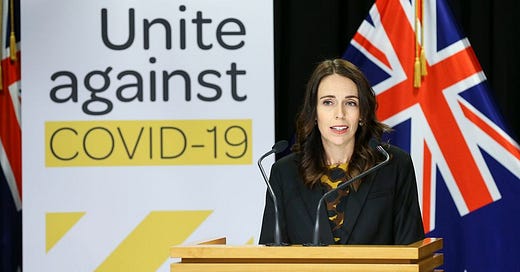New Zealand’s Collapse Finally Ends The Long International Nightmare of "Zero COVID"
Experts incompetently advocated for the impossible and now disproven concept of "elimination.”
Zero COVID was always a delusional fantasy.
Eliminating a virus that can be carried and spread by animals was never remotely possible, plausible or even necessarily advisable given the dramatic trade-offs it would have required.
The very concept of zero COVID was clearly impossible to attain and based on an abandonment of pre-pandemic planning guidance that repeatedly recommended that normal life continue with as little disturbance as possible.
But that didn’t stop governments, experts and media members from zero COVID advocacy and promotion.
As late as December 2020, well after it was glaringly obvious that elimination was not a possibility, Dr. Fauci, while expressing that he didn’t believe COVID could be eradicated, said that it could be “eliminated in certain countries.”
The clip illustrates several of his most destructive misconceptions, that elimination was indeed possible and that it would be achievable through widespread vaccination uptake.
One country that took the messaging to heart and committed to the incomparably nonsensical idea of zero COVID was New Zealand.
New Zealand’s policies have been praised repeatedly by experts and media members and compared favorably to the rest of the world as a model of pandemic leadership, competence and strategy.
What’s been the result of New Zealand’s vaunted pandemic interventions as more variants have emerged into 2022? Certainly, if any country could achieve elimination as Fauci suggested, New Zealand would be among the most likely.
So have they eliminated COVID?
“No” would be a dramatic understatement.
How New Zealand's Covid success made it a laboratory for the world
In April 2021, The Guardian described in great detail how New Zealand’s competence and unwavering commitment to science made them one of the world’s most valuable resources in understanding how COVID spread.
Their policies allowed for the country to avoid lockdowns by tracking the virus quickly and efficiently:
That knowledge has proven critical for New Zealand’s pandemic response, allowing it to avoid longer lockdowns by more precisely mapping the spread.
Hilariously, their tracking efforts provided yet another point of evidence against the endless push for universal masking:
That scenario had dealt with two residents in the country’s managed isolation and quarantine [MIQ] facilities – David and Jane*. David had caught Covid-19 on a plane en-route to New Zealand – then, at some point during his stay, transmitted it to Jane, who happened to be staying in the neighbouring room.
How, I wonder, did “David” catch COVID on a plane when masks are required on planes?
The same bewildering ignorance can be applied to another sentence from the article, describing how two people who never interacted caught COVID from each other:
In the case of Jane and David, it added to a growing body of research establishing how and where aerosol transmission could occur, even between people who weren’t physically occupying the same space.
As is evident from a review of available pre-COVID evidence, masks do not stop aerosols. Aerosol transmission essentially ends any pretense of controlling or stopping COVID in the long run, because it only requires shared air space with someone who’s infected with the virus.
Masks do not stop the spread of aerosols, nor do they protect against inhaling them.
Any reasonable individual reviewing this case would immediately advocate for an end to forced universal masking since there is clearly no benefit against aerosols.
Unsurprisingly, that is not what happened in New Zealand.
Keep reading with a 7-day free trial
Subscribe to Unmasked to keep reading this post and get 7 days of free access to the full post archives.




